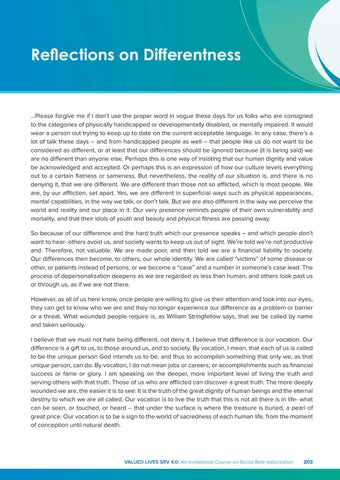Reflections on Differentness
…Please forgive me if I don’t use the proper word in vogue these days for us folks who are consigned to the categories of physically handicapped or developmentally disabled, or mentally impaired. It would wear a person out trying to keep up to date on the current acceptable language. In any case, there’s a lot of talk these days – and from handicapped people as well – that people like us do not want to be considered as different, or at least that our differences should be ignored because (it is being said) we are no different than anyone else. Perhaps this is one way of insisting that our human dignity and value be acknowledged and accepted. Or perhaps this is an expression of how our culture levels everything out to a certain flatness or sameness. But nevertheless, the reality of our situation is, and there is no denying it, that we are different. We are different than those not so afflicted, which is most people. We are, by our affliction, set apart. Yes, we are different in superficial ways such as physical appearances, mental capabilities, in the way we talk, or don’t talk. But we are also different in the way we perceive the world and reality and our place in it. Our very presence reminds people of their own vulnerability and mortality, and that their idols of youth and beauty and physical fitness are passing away. So because of our difference and the hard truth which our presence speaks – and which people don’t want to hear- others avoid us, and society wants to keep us out of sight. We’re told we’re not productive and. Therefore, not valuable. We are made poor, and then told we are a financial liability to society. Our differences then become, to others, our whole identity. We are called “victims“ of some disease or other, or patients instead of persons, or we become a “case” and a number in someone’s case lead. The process of depersonalization deepens as we are regarded as less than human, and others look past us or through us, as if we are not there. However, as all of us here know, once people are willing to give us their attention and look into our eyes, they can get to know who we are and they no longer experience our difference as a problem or barrier or a threat. What wounded people require is, as William Stringfellow says, that we be called by name and taken seriously. I believe that we must not hate being different, not deny it. I believe that difference is our vocation. Our difference is a gift to us, to those around us, and to society. By vocation, I mean, that each of us is called to be the unique person God intends us to be, and thus to accomplish something that only we, as that unique person, can do. By vocation, I do not mean jobs or careers, or accomplishments such as financial success or fame or glory. I am speaking on the deeper, more important level of living the truth and serving others with that truth. Those of us who are afflicted can discover a great truth. The more deeply wounded we are, the easier it is to see: It is the truth of the great dignity of human beings and the eternal destiny to which we are all called. Our vocation is to live the truth that this is not all there is in life- what can be seen, or touched, or heard – that under the surface is where the treasure is buried, a pearl of great price. Our vocation is to be a sign to the world of sacredness of each human life, from the moment of conception until natural death.
Valued Lives SRV 4.0: An Invitational Course on Social Role Valorization 203
